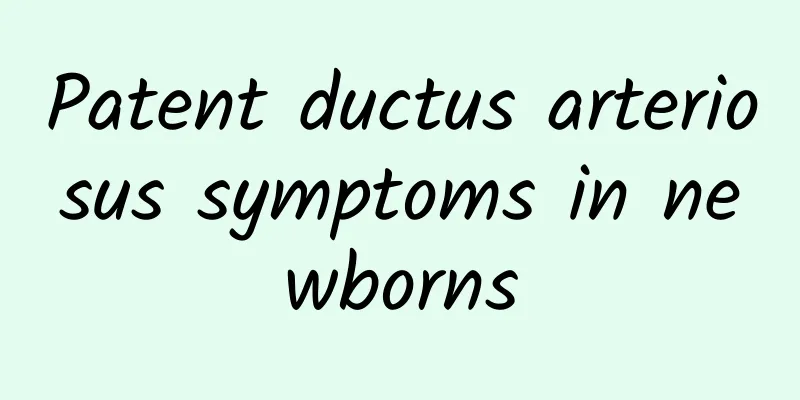Patent ductus arteriosus symptoms in newborns

|
Patent ductus arteriosus is a congenital heart disease. Symptoms include shortness of breath, feeding difficulties, slow weight gain, etc., and prompt medical treatment is required. Treatment methods include medication, surgery, and regular monitoring. 1. Causes of patent ductus arteriosus in newborns The ductus arteriosus is an important blood vessel that connects the aorta and the pulmonary artery during the fetal period. It usually closes naturally within a few hours to a few days after birth. The reasons for non-closure may be related to genetics, environmental factors or premature birth. Premature babies are more likely to have non-closure of the ductus arteriosus due to their incomplete development and immature closure mechanism of the ductus arteriosus. The mother's infection with a virus or exposure to harmful substances during pregnancy may also increase the risk. 2. Symptoms of patent ductus arteriosus in newborns Common symptoms of patent ductus arteriosus in newborns include shortness of breath, rapid heartbeat, feeding difficulties, slow weight gain, and fatigue. In severe cases, heart failure or lung infection may occur. Parents need to observe closely and seek medical attention immediately if they find the above symptoms. 3. Treatment of patent ductus arteriosus in newborns Treatment depends on the severity of the condition. Mild symptoms can be treated with medication, such as ibuprofen or indomethacin to promote ductal closure. Moderate to severe symptoms require surgical treatment, including ductal ligation, minimally invasive closure, or open-chest surgery. Regular follow-up is required after surgery to monitor the recovery of heart function. 4. Nursing recommendations for neonatal patent ductus arteriosus In daily care, parents need to keep the newborn's environment clean and avoid infection. When feeding, they should choose easily digestible food, feed in small amounts and multiple times, and avoid overwork. Take the baby for regular physical examinations to monitor growth and heart function. If there are any abnormalities, communicate with the doctor in time. Although patent ductus arteriosus is a common congenital heart problem in newborns, most children have a good prognosis through timely diagnosis and scientific treatment. Parents need to remain vigilant, pay attention to the health of their babies, and actively cooperate with doctors to ensure the healthy growth of their babies. |
<<: Principles of treatment for patent ductus arteriosus in neonates
>>: Is patent ductus arteriosus normal in newborns?
Recommend
How is Kawasaki disease diagnosed in children?
The cause of Kawasaki disease in children is not ...
Is polio hereditary?
Polio is generally not inherited. It is an infect...
What is the difference between herpetic pharyngitis and hand, foot and mouth disease in children?
The differences between herpangina and hand, foot...
What is the early treatment for Kawasaki disease?
More and more diseases are appearing around us, w...
Traditional Chinese Medicine Treatment of Pneumonia in Children
There are many treatments for pneumonia. Many dis...
How to avoid the harm caused by pneumonia in children
Parents and friends all have a certain understand...
Will children with congenital heart disease be the same as normal people after surgery?
After surgery for congenital heart disease in chi...
What is the standard for immunoglobulin insensitivity in Kawasaki disease?
The standard for Kawasaki disease immunoglobulin ...
What to do if a child has repeated fever due to pneumonia? What medicine to take?
Children with pneumonia and recurrent fever need ...
What are the symptoms of mycoplasma infection in children?
The most common symptom of mycoplasma infection i...
Causes of dry cough in children
As people's pace of life accelerates and thei...
Jaundice and ascites are common features of liver cancer. Liver cancer examination focuses on 4 important indicators
Liver cancer is one of the most common malignant ...
What are the sequelae of infant colds? How to treat infant colds?
Infant colds are common problems and generally do...
Is Hirschsprung's disease life-threatening?
Hirschsprung's disease is life-threatening, a...
Comparison table of jaundice values for infants at 30 days Normal range of jaundice at 30 days
Neonatal jaundice is a common physiological pheno...









